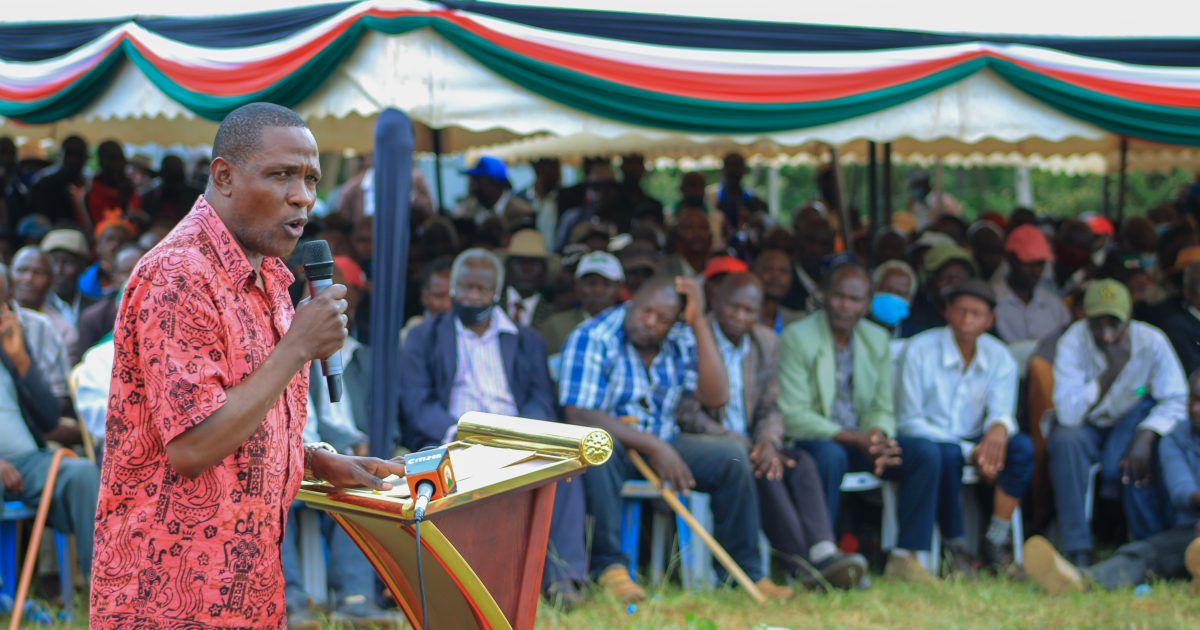The coffee industry has been one of the key pillars of the country’s economic development for decades, contributing an annual average of US$230 million in foreign exchange earnings as Kenya’s third most important export after horticulture and tea.
However, this is a dismal performance according to the Ministry of Agriculture top officials, and requires urgent interventions to reverse the negative trend and ensure sustainability for the sector.
Addressing farmers during a coffee stimulus programme sensitization forum at Kisii Agricultural Training centre in the outskirts of Kisii town, Agriculture CAS for Livestock and Fisheries Development Lawrence Omuhaka said the Ministry had moved to revamp the industry, in a bid to raise the average national coffee production from 2kg to 5Kg per tree per year within the next three years, and raise the growers gross earnings by 50% per year.
He said the revitalization programme sought to support production expansion, adoption of improved coffee varieties, increased use of affordable/subsidized farm inputs, and training of farmers on best agricultural practices.
Omuhaka who was representing CS Peter Munya said the process would upscale production in Kisii which currently stands at 2.5Kgs per tree to 4Kgs with better agricultural methods, and motivation of farmers.
He however appealed to farmers to seek credit from the Sh3 billion Cherry Advance Revolving Fund whose interest rates stood at three per cent (3%) per annum compared to other lenders that offered loans at a higher premium.
The CAS also revealed that the government had introduced a digital or e-subsidy methods on input distribution operations to ease access to a wide range of facilities under the e-voucher system with an aim of promoting sustainable increase in income through improved productivity by farmers.
He said the government was targeting smallholders coffee farmers belonging to a cooperative society, small estate coffee farmers or any other farmers belonging to an association holding less than 20 acres of coffee.
The CAS noted there was an urgent need to deliberately liberate the coffee farmers from private millers and the brokers whom he said had the motive of blocking the government efforts to improve coffee farmers.
He noted the government would not allow the industry to collapse because it risked losing her position as the producer of top-quality premium grade coffee berries while millions of Kenyans risked losing their livelihoods should the farmers abandon coffee farming if it becomes unsustainable.
County CEC agriculture Mr. Esman Onsarigo decried low production of coffee in the region attributing it to low pay, corruption, poor quality and lack of implementation of 2019 coffee regulations among others.
He urged farmers in the local 22 coffee societies and 72 factories to apply best farming practices including stopping water pollution by farming near water sources to improve the quality of produce.
Onsarigo urged the national government to assist with new milling machines as the current ones were too old and contributed to lowering the quality of the product.
He also appealed for direct paying to farmers’ accounts and waiver of loans like has been the case in some parts of the country to jumpstart revitalization of the sector.
New Kenya Planters Co-operative Union (New KPCU) Chief Executive officer Timothy Mirugi assured the farmers that the new reforms at the union which have seen to its change of name would help stop corruption which had bedeviled it for years.
He said the union, which is currently a government entity, will improve the payment for produce and ensure all its assets are safe from corrupt officials.
By Augustine Mosioma and Jane Naitore





